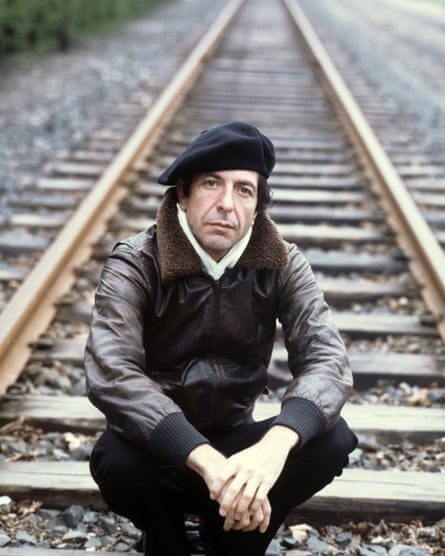The voice is unmistakable. That rich grain and mournful, lived-in tone can only be Leonard Cohen. His song Suzanne plays, while on stage a woman falls into the arms of a man. He curls then lifts and balances her body again and again, without her feet ever touching the ground. The dancers are from Canadian company Ballets Jazz Montréal, and Cohen gave his blessing to the creation of this show set to his songs. He agreed to the music selections and chose specific recordings, but died in November 2016 at the age of 82, before the rehearsal process had begun.
“He was supposed to be at the premiere,” says dancer Andrew Mikhaiel. “He was supposed to see the show. So the moment we stepped into the studio on the first day, there was a weight to it. We had to represent him and deliver something quite magical. He’s a Canadian icon: it was such a huge responsibility. But at the premiere – I will never forget this – we were all in a circle together and we felt his presence.”
The show, titled Dance Me, has been touring since 2017. In 2021, a new director, Alexandra Damiani, took over from Louis Robitaille, who commissioned the work. Often new bosses want to sweep out old rep and put their own stamp on things – and Damiani did initially have doubts about dancing to such distinctive, well-loved music. “I could see all the traps it could fall into,” she says. “The work of Leonard Cohen can stand on its own. I don’t need a dance to enjoy it, so they had better give me another way of experiencing it.” Then she saw the show. “I was disarmed by the beauty of it,” says Damiani. “It’s such a poetic homage.”
She can’t have been blind to the commercial appeal either, nor the instant connection audiences have with the music – although Dance Me is not like a jukebox musical, where you use the songs to tell stories or illustrate a singer’s biography. There’s no straightforward narrative here: instead there are moods and themes, flickers of imagery, hints of relationships. “There’s sensuality, depression, love, loss – Cohen’s body of work represents everything about life,” says Mikhaiel. “It’s like we take a walk with the dancers,” says Damiani, “through fall, winter, spring and summer. We go through time with them. Cohen did say, ‘There is a crack in everything. That’s how the light gets in.’ To me, the dance is almost going through the cracks of the songs.”
This is Ballets Jazz Montréal’s first visit to the UK since 2011. Despite their name – they started out in 1972, performing ballet to jazz – they’re now a contemporary company, and Dance Me was created by three choreographers: Belgian Annabelle Lopez Ochoa, Greek choreographer Andonis Foniadakis and the Swiss-based Briton Ihsan Rustem. Each have different styles, although in the final piece you can’t always be sure who made what. Foniadakis brings “life force and bite”, says Damiani. “In Boogie Street, it feels very sexy, uber-energetic and dynamic, which is part of the essence of the company.” Mikhaiel says: “I see the music when I watch Andonis’s work.”
Rustem, meanwhile, was most interested in the stories and poetry of the songs, arriving at rehearsal with his “bible” full of lyrics. While Lopez Ochoa, known for making the Frida Kahlo ballet Broken Wings for English National Ballet and A Streetcar Named Desire for Scottish Ballet, is described by Damiani as “geometric and clean – but also very human”.
The performers are very easy to watch, quick and lithe, semi-clad, molten bodies and long legs everywhere, all very seductive (as Damiani puts it, “bare-chested and giving it 200%”). But they also feed on some of the layers and contradictions of the music, which moves from ominous to yearning, haunting to sweet; dark and light at the same time. “Dance Me to the End of Love is the most beautiful sad song – it sounds gorgeous but the message is so heavy,” says Mikhaiel. “Famous Blue Raincoat sounds like a lullaby, but it’s about a love triangle. In our show, it’s visually beautiful but Andonis does a good job of showing how chaotic relationships can be.”
Mikhaiel finds himself tuning into different elements of the music with each performance. “Sometimes you dance to the tone of his voice. Sometimes you react more to the musicality, the instruments. Sometimes you find yourself lost in the story of the song.” Despite dancing in more than 180 shows, Mikhaiel still finds it a thrill to move to Cohen’s voice. “I get chills listening to the songs,” he says. “Every time the beat kicks in in Nevermind, my heart flutters.”

